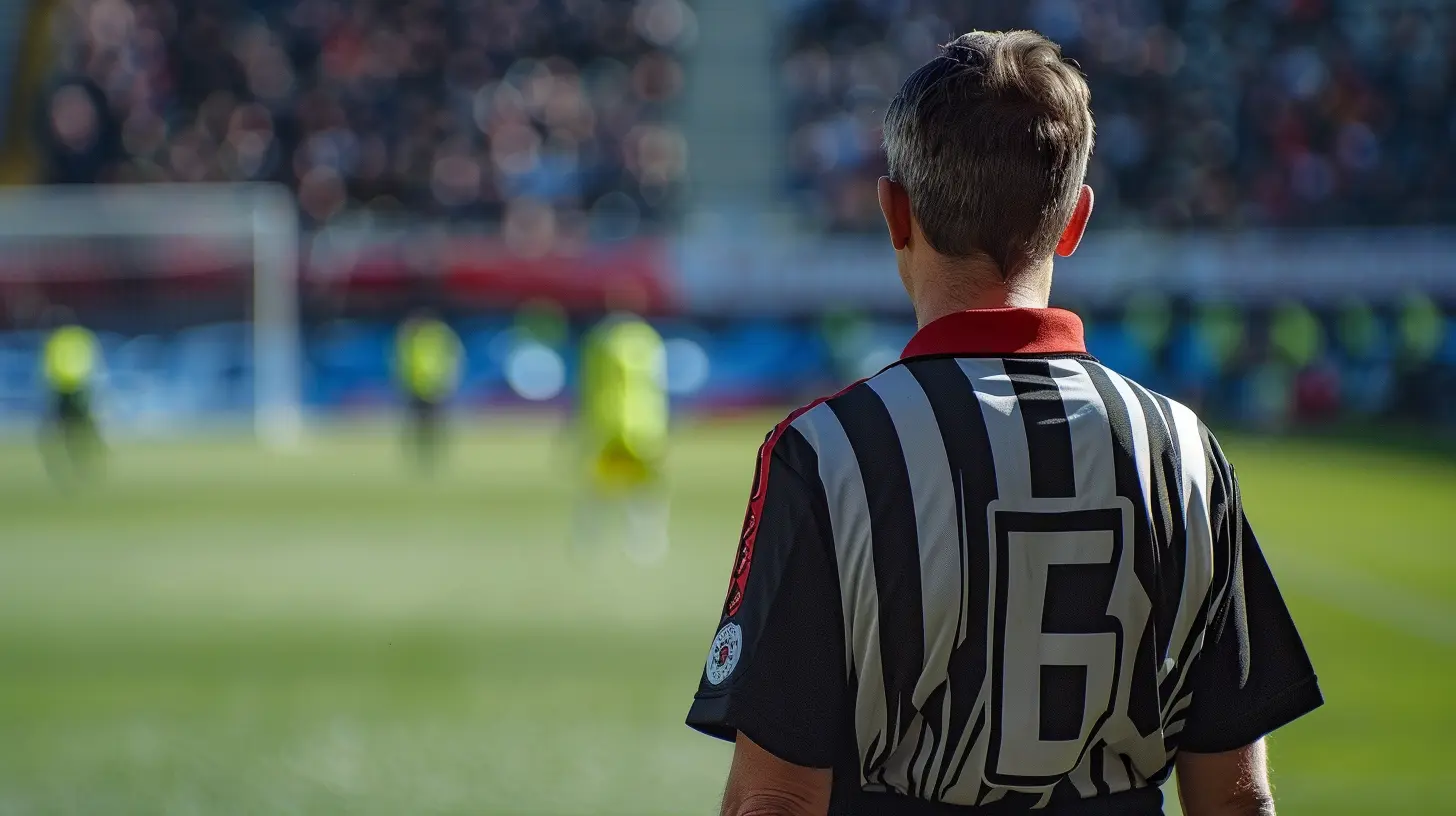From Grassroots to Professional: The Journey of a Referee
17 November 2025
Ever watched a game and wondered, “How did that ref get there?” Most people think referees just pop up at the top level with a whistle and a uniform. But oh man, it’s a journey — a long, gritty, underappreciated journey filled with early mornings, split-second decisions, and a whole lot of passion for the sport. Whether it’s soccer, basketball, rugby, or any other sport, the path from the local park to the pro arena is anything but easy.
Let’s pull back the curtain and take a real look at what it takes to become a referee, from humble grassroots beginnings to making calls in front of thousands of fans.
The Starting Whistle: Getting Into Officiating
So where does it all start? Honestly, most referees begin at the community or youth level. Many are former players who want to stay involved in the game they love. Others take their first step because their kid's team needs someone — anyone — to help out.In most sports, the first step is getting certified. This usually involves a short course — think a long weekend — where you learn the basics. We’re talking rules, positioning, how to blow the whistle properly (yes, there’s a right way), and how to manage players and coaches who may not always… let's say, “see things your way.”
Your first games? They’re often rough. Imagine being 16 and having to explain your offside decision to an angry coach twice your age. Trial by fire? Pretty much.
But here’s the kicker — that’s where the real learning happens.
Learning the Ropes: Game by Game
Once certified, you start building up your experience. Each match becomes a classroom, each mistake a lesson. Veteran refs often say, “You don’t become a good referee by reading a rulebook — you become one by making 1,000 decisions and learning from each one.”At this level, you're juggling more than just officiating. Most grassroots refs have day jobs or are still in school. Weekends involve traveling to different neighborhoods, often to fields with no changing rooms and maybe a broken goalpost. It's not glamorous.
But it’s also where the passion blooms. Getting a close call right. Earning respect from players. Feeling the pulse of the game. These small wins keep you coming back.
Climbing the Ladder: Moving Up the Levels
After a few seasons, if you show promise and consistency, you might get invited to referee higher-level matches. We're talking semi-pro, regional leagues, college games — and here’s where things start to get serious.To move up, you'll need more than just good calls. You’re evaluated constantly. There are assessor reports, video reviews, and fitness tests (yes, being a ref requires serious stamina — you're not just casually strolling around!).
You’ll also work on stuff like body language, communication, and conflict resolution. Why? Because by now, you’re not just enforcing rules — you’re managing personalities. Coaches with egos the size of stadiums. Players who try to game the system. Crowds that roar every time you raise your arm.
It’s all part of the growth.
The Mental Side of the Game
Let’s be real — refereeing is mentally exhausting. You know those players who dive dramatically? Or fans who scream “REF, OPEN YOUR EYES”? Yeah, that’s the daily grind.Referees have to develop mental toughness. You have to block out the noise, stay focused, and own your decisions — even if everyone’s booing you.
Many refs even work with sports psychologists as they advance. Confidence, decision-making under pressure, managing adrenaline — all of that matters just as much as knowing the rules inside out.
And it's not just about the 90 minutes (or however long the game is). There's preparation involved: studying teams, reviewing past games, staying in top physical shape. It's a lifestyle, not a hobby.
Technology: A Blessing or a Burden?
If you thought refereeing was hard before, throw in technology like VAR (Video Assistant Referee) or instant replay.Yes, tech helps get more decisions right. But it also puts referees under a microscope. Every handball, offside, or foul is dissected in slow motion from six angles on social media five minutes later.
And guess who gets the blame if something isn’t perfect? Yup.
Professional referees now have to be tech-savvy too. They spend hours training on how to review plays properly on screens, communicate with the VAR team, and make the final call when the pressure is sky-high.
Refereeing has evolved — and the expectations have never been higher.
Breaking into the Professional Scene
Getting onto the professional circuit isn’t as straightforward as applying for a job. It's a mix of talent, opportunity, networking, and — honestly — a bit of luck.National governing bodies and pro leagues have structured promotion paths, but only a handful of referees make it to the top. To even be considered, you’ll need:
- Years of top performance at lower levels
- Strong physical and psychological evaluations
- Consistent assessments and positive feedback
- A deep understanding of the game and excellent game management
And even then, you're starting at the bottom of the professional tier. Think fourth official on a rainy Tuesday night. From there, you build your reputation, just like a player would.
The Life of a Professional Referee
At the pro level, refereeing becomes a full-time gig in many sports. But let's clear something up — only a select few refs in the world earn superstar money. The vast majority do it for the love of the game.Travel becomes a weekly reality. You might be in one state today, another country tomorrow. Time with family is limited, and maintaining peak fitness is a year-round commitment.
But there are some serious perks too:
- Being part of the game at its highest level
- Officiating iconic matches and moments
- Earning respect from the best players and coaches in the world
And the adrenaline rush of making the right call in front of 80,000 fans? Unmatched.
Challenges and Criticisms
Let’s not sugarcoat it — referees get a ton of flak. You're often the villain, no matter what decision you make. Social media abuse? Sadly, it’s common. Some referees even receive threats.That’s why support systems are crucial. Mentors, referee unions, mental health resources — they're all necessary to help refs cope with the darker side of the job.
There’s also an ongoing push in many countries to protect referees at the grassroots level. Penalties for abuse. Sideline behavior codes. Education for coaches and parents.
Because without grassroots refs, the whole sport collapses.
Women in Refereeing
It’s not just a man's game anymore. Women are breaking barriers in refereeing across almost every major sport. From officiating men’s World Cup matches to leading in top domestic leagues, female referees are proving they belong.Their journey often involves even more hurdles — bias, skepticism, and lack of opportunities. But change is happening, and it's amazing to witness. The more diversity in officiating, the better the game becomes for everyone.
Final Thoughts: Why Become a Referee?
Refereeing isn’t for the faint-hearted. It demands thick skin, sharp focus, and relentless dedication. But it’s also one of the most rewarding paths in the sporting world.You’re not just controlling a game — you’re upholding its integrity. You’re making sure the contest is fair. You’re part of every goal, every tackle, every victory and heartbreak.
And while the spotlight may not always shine on referees, the game can’t go on without them.
So the next time you’re watching a match and see the ref running their heart out, blowing the whistle with confidence, remember — that moment is the result of years of grinding, learning, failing, and growing.
From grassroots to professional? It’s a journey worth respecting.
all images in this post were generated using AI tools
Category:
RefereeingAuthor:

Umberto Flores
Discussion
rate this article
1 comments
Rocket Lamb
Who knew the path from 'Hey, you're blocking my view!' to 'Ladies and gentlemen, the referee!' could be so epic? It’s like the referee version of a superhero origin story—complete with a cape made of yellow cards and a whistle that could stop traffic!
December 13, 2025 at 4:03 AM

Umberto Flores
Thank you! I'm glad you enjoyed the journey from grassroots to professional refereeing. It truly is an epic transformation, filled with passion and dedication!


